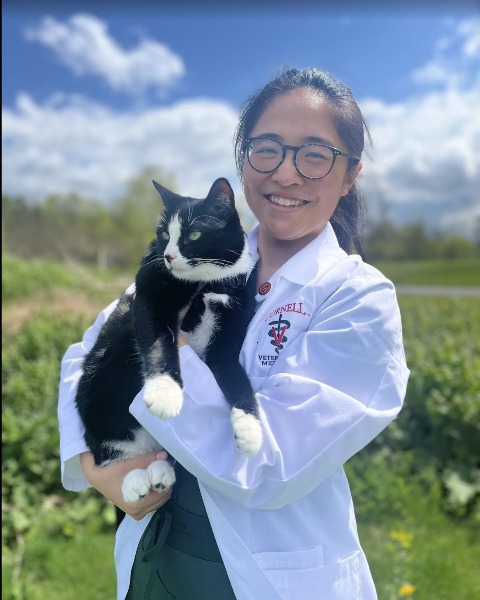Small Animal Internal Medicine
(IM08) Leptospirosis Vaccine Responses Are Maintained in a Cohort of Alaskan Sled Dogs Aged 8-14
Friday, June 20, 2025
10:30 AM - 10:45 AM ET
Location: Exhibit Hall Poster Park - Kiosk 7

Lynna Li, BSc (she/her/hers)
Ms.
Cornell University College of Veterinary Medicine
Ithaca, NY, United States
Research Abstract - ePoster Presenter(s)
Abstract:
Background: Leptospirosis is a zoonotic bacterial disease. Currently, vaccination is the primary method of prevention. Serovars included in vaccines for dogs are Icterhaemorrhagiae, Canicola, Pomona, and Grippotyphosa. The efficacy of this vaccine has not been well-researched in senior dogs, which may have diminished vaccine responses. Hypothesis/
Objectives: The main objective of this study is to use vaccine titers as a marker for amnestic response to understand the relationship between age and immune function within senior dogs. Animals: 103 retired sled dogs (56 males, 47 females) aged 8-11 years old.
Methods: Pre-vaccine blood was collected just before annual 4-serovar leptospirosis vaccine administration. Post-vaccine was collected 1 month after vaccination. Leptospira Microscopic Agglutination Test (MAT) titers were performed on sera. Reciprocal titers were compared between age groups and years of vaccine administration using the Kruskal-Wallis test.
Results: There were no significant differences when comparing age groups across all serovars. The titers of different years were also compared to analyze the potential effects of boosters on titer values. Despite significant differences between several year comparisons, there was no evident trend in seen in any serovar. Conclusions and clinical importance: A significant decline in vaccine response within this cohort of senior dogs was not observed. These results suggest that aging in the range assessed may not cause a significant decrease in immune response to the Leptospirosis vaccine.
Background: Leptospirosis is a zoonotic bacterial disease. Currently, vaccination is the primary method of prevention. Serovars included in vaccines for dogs are Icterhaemorrhagiae, Canicola, Pomona, and Grippotyphosa. The efficacy of this vaccine has not been well-researched in senior dogs, which may have diminished vaccine responses. Hypothesis/
Objectives: The main objective of this study is to use vaccine titers as a marker for amnestic response to understand the relationship between age and immune function within senior dogs. Animals: 103 retired sled dogs (56 males, 47 females) aged 8-11 years old.
Methods: Pre-vaccine blood was collected just before annual 4-serovar leptospirosis vaccine administration. Post-vaccine was collected 1 month after vaccination. Leptospira Microscopic Agglutination Test (MAT) titers were performed on sera. Reciprocal titers were compared between age groups and years of vaccine administration using the Kruskal-Wallis test.
Results: There were no significant differences when comparing age groups across all serovars. The titers of different years were also compared to analyze the potential effects of boosters on titer values. Despite significant differences between several year comparisons, there was no evident trend in seen in any serovar. Conclusions and clinical importance: A significant decline in vaccine response within this cohort of senior dogs was not observed. These results suggest that aging in the range assessed may not cause a significant decrease in immune response to the Leptospirosis vaccine.


